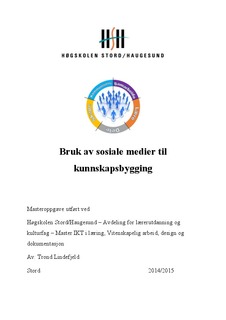| dc.description.abstract | The purpose of this master thesis is to examine how 10th grade students use social media in school related activities and in the act of building knowledge. Teachers may use these findings to exploit the students learning potential in a better way. The main research question is: How do 10th grade students use social media in school related activities?
The quick changes and development in our society, both national and international, has changed the demands for employees in the future labour marked. The Norwegian school curriculum is in line with this development, and contains goals for competences related to the 21st century. The use of social media is central in several of the competence areas described in the Ludvigsen-committee documents (NOU 2014: 7) regarding school in future times. The regulation of social media use is different both between and inside municipalities and schools, and these differences influence the vocational training of the students. A lot of teachers are also both unexperienced and sceptical towards the use of social media in school related activities. By gaining insight in students’ use of social media in school related activities and in the act of building knowledge, teachers can use this information to better exploit the learning potential of their students.
To shed light on the research questions, a qualitative study has been conducted. The approach is a phenomenological case study. I have chosen this approach based on the main reason of this study. When I study students’ use of social media in school related activities and in the act of building knowledge, it is their reflection and experience which I intend to shed a light on. I have used quasi-statistics and semi-structured interviews in this inquiry. In addition to this, I also contacted the informants through social media for three weeks after the interviews were conducted. 36 students completed the survey. 15 students were interviewed, and I followed up 14 of those through social media. All students attend 10th grade at the same secondary school. The informants’ experiences and perspectives are the main focus in this study, and their reflections form the main part of the findings. In addition to this perspective, reflections considering how teachers better can exploit the learning potential of their students, is also a part of this master thesis. My findings are sorted out, systemized and analyzed in light of previous research on the field and relevant theories. The master thesis is affiliated with sociocultural learning theories and literature considering teaching, learning and competences related to the 21st century. The data analysis shows the students as active users of social media. The habitual use of social media is most common, but the students also have
an intended use of social media. The students both appreciate and see the utility value of social media use in school related activities and in the act of knowledge building, and it is desirable for them with a wider range of adaption in this area in school related activities. Even though it is natural for the students to use their social network active in the act of knowledge building, they are fully aware of the unfulfilled learning potential of these resources. With advantage, teachers can exploit the students’ digital competence in their act of teaching, and it is important for the students to learn how to learn the best way possible. The school in this study is well situated and prepared for teaching fitted to the 21st century, but an increase in ICT competence is needed to exploit the learning possibilities modern technology has to offer. | nb_NO |
